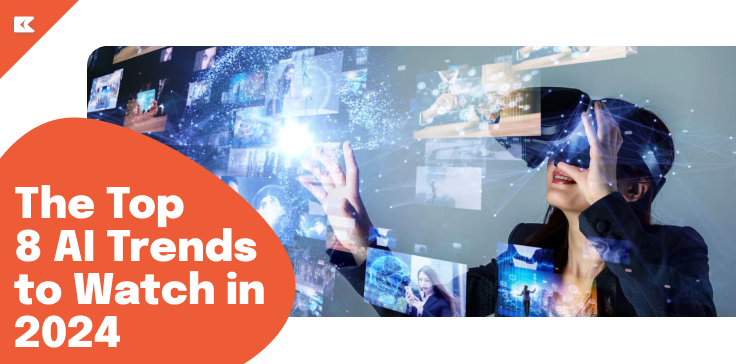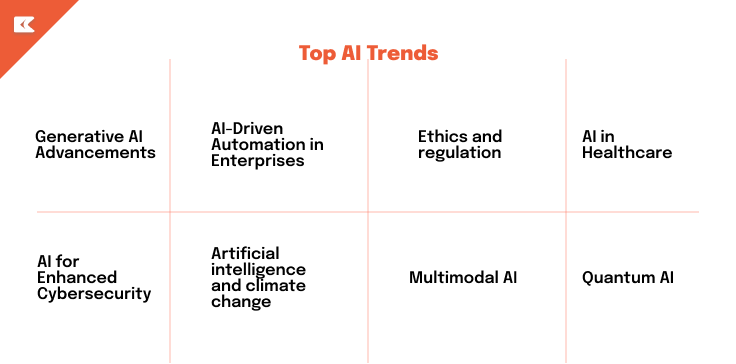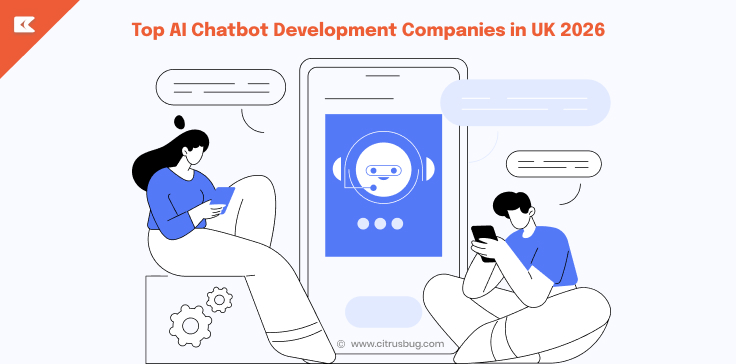
AI technology is rapidly progressing, driving innovation and revolutionising industries worldwide. According to McKinsey’s predictions, this trend could add $13 trillion to global GDP over ten years as businesses transition from using standalone AI tools into becoming fully AI-powered organisations.
AI technology continues to advance at a remarkable rate. Successful incorporation requires human expertise as AI becomes ever more sophisticated; staying current on AI trends is essential if businesses wish to remain competitive; with market projections projecting growth up to $1.8 trillion by 2030, now is the perfect opportunity to discover which trends may shape its future development.
Top AI Trends Shaping the Future of Technology
1. Generative AI Advancements
Generative AI is revolutionizing industries by automatically empowering machines to generate text, images, and music content. Tools like GPT or AI writer are used in customer support or creative writing tasks, while AI-generated art accelerates content production.
Healthcare systems use it to speed drug development; software developers use it to automate coding tasks; businesses increasingly adopt this technology to boost creativity and productivity across sectors – backed by impressive generative AI statistics, it is one of the top AI trends shaping the future of innovation
2. AI-Driven Automation in Enterprises
The digital enterprise extends technology beyond its core operations, focusing on customer satisfaction. It leverages data to uncover opportunities, risks, customer expectations, and competitor actions. Digital organizations can respond swiftly and precisely with agile and contextual data insights.
These data-driven enterprises make decisions and take actions informed by analytics. Unlike traditional organizations, they fully harness technology, integrating artificial intelligence, machine learning, and advanced analytics to automate insights and boost data value.
The transformation journey involves:
- Modernizing legacy systems.
- Establishing intelligent cognitive systems.
- Utilizing AI to create a learning, adaptable organization capable of evolving quickly and making better, data-driven decisions across all aspects of the business.
3. Ethics and regulation
Artificial intelligence (AI) presents ethical challenges and risks for consumers, companies, and investors. Uneven AI regulation across jurisdictions adds to the uncertainty. Investors should focus on transparency and explainability to manage these risks. It’s important for an investor to familiarize themselves with investor decks to make sure they are clear of all the terms.
AI’s ethical concerns start with the developers who create it, extending to the companies using AI and, ultimately, to consumers and society. Investors face risks at both levels through their stakes in AI developers and AI-integrating companies. While AI advances rapidly, global regulators and lawmakers are still catching up, with many countries recently releasing AI strategies.
4. AI in Healthcare
Artificial Intelligence (AI) has made significant advances in early disease detection. A tool created by MIT and MGH researchers called Sybil can accurately predict whether lung cancer will form within one year with an accuracy rate ranging between 86%-94%.
An additional example would be a health tech start-up that won the Innov8 Talks pitch competition at Florida International Medical Expo 2023 for its artificial intelligence-powered solutions in early disease detection.
AI’s impact is also evident in infectious disease surveillance, where early-warning systems benefit from AI algorithms and analytics. For diseases with historically grim prognoses, like pancreatic cancer, AI algorithms are being deployed to identify the disease earlier, potentially when a cure is still possible.
Additionally, Duke University researchers have developed a computer program that can determine with 94% accuracy if a person’s age-related macular degeneration (AMD) will worsen.
5. AI for Enhanced Cybersecurity
According to Verified Market Research, the market size for AI in cybersecurity will reach $24.8 billion in 2024 and is projected to reach an impressive $102 billion by 2032. These figures are hardly surprising, considering hackers also maliciously leverage new technologies.
The escalating frequency of cyberattacks has sparked international attention toward the potential use of AI in cybersecurity. A survey by The Economist Intelligence Unit revealed that 48.9% of global executives and security experts consider AI and machine learning potent tools to combat modern security threats. Furthermore, Pillsbury’s report highlighted that 44% of global organizations already leverage AI to detect security intrusions.
AI in cybersecurity establishes secure applications by default, eliminating vulnerabilities for users. By eradicating negative defaults, AI guarantees precision in detecting issues, expediting investigations, and automating response mechanisms. AI-driven solutions, such as user verification through behavioural biometrics, foster secure app development and promote a safe data ecosystem, contributing to a robust infrastructure.
6. Artificial intelligence and climate change
AI’s ability to analyze large datasets and uncover actionable insights holds excellent promise in shaping how we view climate change and manage its consequences.
Through analysis of weather data and electricity demand patterns, its algorithms optimize wind and solar power operations, increasing their efficiency and grid integration for a more secure supply of clean energy.
When applied to climate change mitigation, AI’s most significant strength lies in its potential to help industries reduce their carbon footprints across sectors. Top AI algorithms assist in designing energy-efficient buildings, planning low-emission transportation routes, and even carbon capture technologies. By streamlining operations and pinpointing areas for savings, AI contributes significantly to climate change mitigation efforts.
7. Multimodal AI
Multimodal AI is a type of artificial intelligence that processes and integrates multiple types of data—such as images, sounds, and text—at once. In machine learning, modality is a given kind of data.
Multimodal AI can perform tasks that single-modality AI cannot by combining different data types. For example, it can analyze a photo, understand spoken instructions about the photo, and generate a descriptive text response. This makes it highly useful in various applications, from customer service to advanced security systems.
8. Quantum AI
Quantum AI (QAI) is where quantum computing meets artificial intelligence. It’s a powerful combination. AI already helps industries analyze data and make decisions. But quantum computing takes this further. Instead of handling data one bit at a time, quantum computers use qubits. And qubits can process complex information much faster than regular computers.
This means Quantum AI can solve challenging problems in fields like finance, healthcare, and logistics. Think about AI accurately predicting market changes or helping discover completely new medicines—things we thought were out of reach.
Quantum AI is still in the early stages. It faces challenges like hardware instability and the need for new algorithms. However, advances in error correction and qubit stability are improving its reliability.
Tech companies are testing Quantum AI for defect detection, traffic optimization, and energy storage tasks. Most real-world uses are still in development, but the future looks promising.
9. AI-Powered Document Summarization
The ability to extract key insights and summaries from lengthy documents is becoming increasingly crucial in today’s fast-paced world. AI-powered tools like an AI PDF Summarizer offer an innovative solution by quickly analyzing PDF documents and providing concise, actionable summaries. This technology is invaluable across industries such as legal, education, and business, saving time and improving decision-making efficiency.
Develop Intelligent AI Solutions with Citrusbug.
In today’s fast-evolving digital landscape, Citrusbug stands at the forefront of delivering cutting-edge AI software development solutions tailored to businesses’ unique needs. With a commitment to excellence and innovation, Citrusbug helps companies navigate the complexities of artificial intelligence, providing scalable and robust solutions. From automating processes to improving customer experiences or building predictive models, our AI/ML development services equip businesses with the necessary tools for success in an AI-powered world. Partner with Citrusbug to help turn ideas into intelligent AI solutions with real-world impact.





 SaaS Development
SaaS Development Web Application Development
Web Application Development Mobile Application Development
Mobile Application Development Custom Software Development
Custom Software Development Cloud Development
Cloud Development DevOps Development
DevOps Development MVP Development
MVP Development Digital Product Development
Digital Product Development Hire Chatbot Developers
Hire Chatbot Developers Hire Python Developers
Hire Python Developers Hire Django Developers
Hire Django Developers Hire ReactJS Developers
Hire ReactJS Developers Hire AngularJS Developers
Hire AngularJS Developers Hire VueJS Developers
Hire VueJS Developers Hire Full Stack Developers
Hire Full Stack Developers Hire Back End Developers
Hire Back End Developers Hire Front End Developers
Hire Front End Developers AI Healthcare Software Development & Consulting
AI Healthcare Software Development & Consulting Healthcare App Development
Healthcare App Development EHR Software Development
EHR Software Development Healthcare AI Chatbot Development
Healthcare AI Chatbot Development Telemedicine App Development Company
Telemedicine App Development Company Medical Billing Software Development
Medical Billing Software Development Fitness App Development
Fitness App Development RPM Software Development
RPM Software Development Medicine Delivery App Development
Medicine Delivery App Development Medical Device Software Development
Medical Device Software Development Patient Engagement Software Solutions
Patient Engagement Software Solutions Mental Health App Development
Mental Health App Development Healthcare IT Consulting
Healthcare IT Consulting Healthcare CRM Software Development
Healthcare CRM Software Development Healthcare IT Managed Services
Healthcare IT Managed Services Healthcare Software Testing services
Healthcare Software Testing services Medical Practice Management Software
Medical Practice Management Software Outsourcing Healthcare IT Services
Outsourcing Healthcare IT Services IoT Solutions for Healthcare
IoT Solutions for Healthcare Medical Image Analysis Software Development Services
Medical Image Analysis Software Development Services Lending Software Development Services
Lending Software Development Services Payment Gateway Software Development
Payment Gateway Software Development Accounting Software Development
Accounting Software Development AI-Driven Banking App Development
AI-Driven Banking App Development Insurance Software Development
Insurance Software Development Finance Software Development
Finance Software Development Loan Management Software Development
Loan Management Software Development Decentralized Finance Development Services
Decentralized Finance Development Services eWallet App Development
eWallet App Development Payment App Development
Payment App Development Money Transfer App Development
Money Transfer App Development Mortgage Software Development
Mortgage Software Development Insurance Fraud Detection Software Development
Insurance Fraud Detection Software Development Wealth Management Software Development
Wealth Management Software Development Cryptocurrency Exchange Platform Development
Cryptocurrency Exchange Platform Development Neobank App Development
Neobank App Development Stock Trading App Development
Stock Trading App Development AML software Development
AML software Development Web3 Wallet Development
Web3 Wallet Development Robo-Advisor App Development
Robo-Advisor App Development Supply Chain Management Software Development
Supply Chain Management Software Development Fleet Management Software Development
Fleet Management Software Development Warehouse Management Software Development
Warehouse Management Software Development LMS Development
LMS Development Education App Development
Education App Development Inventory Management Software Development
Inventory Management Software Development Property Management Software Development
Property Management Software Development Real Estate CRM Software Development
Real Estate CRM Software Development Real Estate Document Management Software
Real Estate Document Management Software Construction App Development
Construction App Development Construction ERP Software Development
Construction ERP Software Development






